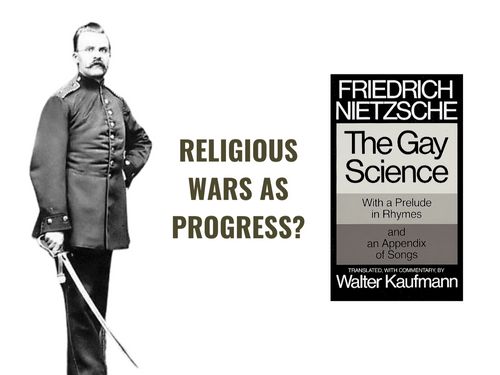Nietzsche on religious wars and more
Oct 16, 2021 · 2 mins read
0
Share

The Gay Science is one of Nietzsche's most interesting books. Here are its best insights on art, religious wars, and more👇
Save
Share
Religious wars as progress. Religious wars show the masses have become subtle enough "to treat concepts with respect." Religious wars are only possible when people realize that mental concepts shape physical outcomes. For Nietzsche, this signifies the growth of the common mind.
Save
Share
In the past, fairy tales & miracles were a release from a world that worked according to "iron necessity." Today, science is a release from a world with no metaphysical certainties. Science acts as the only piece of "firm old earth" for people for whom everything is fickle.
Save
Share
It's hard to be disingenuous or inauthentic over the long term. Nietzsche writes: "It always shows what has weight for us and what does not." Concern, love, interest - hard to meaningfully fake.
Save
Share
Formerly, all art was made to "commemorate high and happy moments." Now, Nietzsche writes, art is made to offer a "brief lustful moment" to people who are "wretched, exhausted, and sick." Art was a celebration. Now it is a fake escape.
Save
Share
Nietzsche dislikes remorse. Consider your actions "experiments and questions." They're nothing but "attempts to find out something." Important "answers" come with both favorable and unfavorable outcomes. To regret is to leave your past self "in the lurch" - and that's "indecent."
Save
Share
Why has freestyle verse replaced rhyming poetry? The world is moving away from melody because it "delights so openly in lawfulness." Melody has a disdain for "everything still unformed and arbitrary." Melody - a painful reminder of an orderly, now lost, world?
Save
Share
Nietzsche writes: "It requires more genius to spend than to acquire." To acquire money, you learn what's profitable and repeat it. But to spend, you must answer hard questions: What's worth spending on? What makes me content? Spending well is tougher than acquiring a lot.
Save
Share
Art creates a hunger that can only it can satisfy. When people are overwhelmed with emotions in real life, they don't give eloquent speeches. But in theatre & movies they do. This creates a hunger to hear poignant speeches in tense moments - a hunger that reality can't satisfy.
Save
Share
Bottom line. Nietzsche turns conventional wisdom on its head in this book. He explains why it takes more genius to spend than to acquire, why religious wars signified progress, and how science fulfills an often ignored emotional role: providing certainty when nothing else does.
Save
Share
0